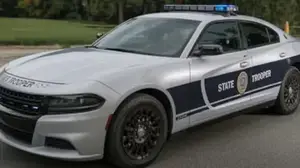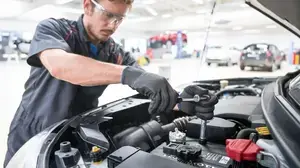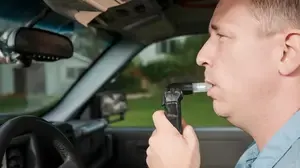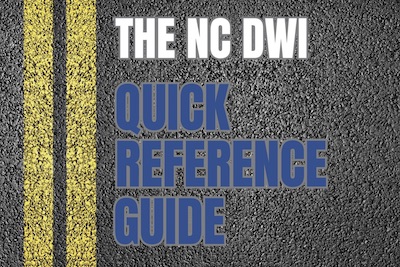Ignition Interlock Devices in North Carolina
 The "blow and go” ignition interlock device is an in-car breath-testing machine that looks for the presence of alcohol. It requires a breath sample, every time, before starting the vehicle.
The "blow and go” ignition interlock device is an in-car breath-testing machine that looks for the presence of alcohol. It requires a breath sample, every time, before starting the vehicle.
Fail the breath test? You’re not starting the car. Fail while you’re driving, your lights will start flashing and your horn will honk to alert police. Fail after driving while submitting an “arrival test,” that and the other two failures will be reported back to the North Carolina Department of Transportation - Division of Motor Vehicles (NCDMV) for the possible suspension or revocation of your license.
What’s more, even people not subject to the restriction who drive your car are required to provide breath samples and you’re legally responsible for those results. That’s means their positive readings for alcohol, if any, can have negative consequences to your license. Clearly, if you need to drive, that’s a big deal.
As stated, the ignition interlock device, or “IID” as some DUI defense lawyers call it, also requires random breath samples, called rolling tests while driving down the road. The purpose of such additional breath testing is to confirm you have not consumed alcohol since start-up.
That also helps ensure one person doesn’t start the car and allow someone else, who may have alcohol in their system, to thereafter operate the vehicle. How the ignition interlock works, the legal consequences of positive readings, and where you can go to get an ignition interlock installed are all discussed in this article.
If you have questions specific to your legal matter or individual circumstances in the Charlotte metro region, the Powers Law Firm is available for consultation. We help people in Mecklenburg, Iredell, Union, Gaston, Rowan, and Lincoln County NC. You may TEXT or call our DUI lawyers at 704-342-4357.
Under the NC DWI laws, an interlock can be required for several different reasons. In fact, it can be pursuant to a Court Order or NCDMV, depending on the nature and circumstances of the DUI charges and associated license revocation. There have been some big changes to the NC Limited Driving Privilege Laws. Indeed, some drivers who have been previously unable to drive legally may now be eligible for a limited driving privilege. Clearly each case and fact pattern is unique. Consult legal counsel.
One of the more common reasons that requires installation of an ignition interlock is if you are convicted of DWI with the BAC level of .15 or higher. That’s called Gross Impairment. The NC DWI laws do not refer to the offense as “drunk driving” or “drunken driving.”
Pursuant to N.C.G.S. 20-17.8, the sentencing Judge cannot issue a Limited Driving Privilege without proof of installation, which is established by providing a copy of the installation report and associated contract. There is a type of Limited Driving Privilege called an Ignition Interlock Limited Driving Privilege Impaired Driving or Open Container or Underage Alcohol Violations (North Carolina Convictions Only). There is also an Ignition Interlock Limited Driving Privilege Impaired Driving for Out of State and Federal Convictions.
In the past, any privilege issued by a Judge prior to the expiration of a 45-day mandatory hold was disallowed by the Division of Motor Vehicles (DMV). Under the old DWI law in North Carolina, there was no provision for a hardship privilege, work privilege, or limited privilege during the 45-day waiting period/punishment after a conviction.
That law has since changed, allowing the issuance of an Ignition Interlock Limited Privilege in certain circumstances.
If you’re caught driving while in a period of revocation or suspension due to impaired driving, you can be charged with DWLR Imp Rev, which is a Class 1 Misdemeanor in North Carolina, which carries up to 120 days of incarceration (jail). You may also be Ordered to Surrender your license or Limited Driving Privilege.
The ignition interlock may also be a requirement for conditional restoration of a driver license by NCDMV. There is a legal process for such which often requires execution of a Conditional Restoration Agreement with North Carolina DMV.
That may occur in some matters after a driver's license has been permanently suspended, the driver is eligible for a hearing, and the hearing officer requires an interlock device as a condition to restoring your license. It’s frankly a bit complicated. That’s one reason it makes sense to seek experienced legal counsel if you’re interested in requesting a restoration hearing or challenging a license suspension or revocation.
There are now 4 approved interlock providers in North Carolina who can install, monitor, and service the device on your vehicle. They are:
Intoxalock
866-306-5015
Intoxalockselect.com/driveSmart Start
800-880-3394
smartstartinc.comAlcolock USA
855-664-0353
AlcolockNC.comMonitech
844-598-5557
MonitechNC.com
Under the old DWI law, if North Carolina DMV required the interlock for conditional restoration, all vehicles registered to that driver were required to have an interlock device installed. That law also has changed, authorizing the operator to designate a single vehicle upon which an approved Ignition Interlock Device is to be installed.
NOTE: In North Carolina, and if eligible for installation of an ignition interlock device (IID), you may able to drive without an approved ignition interlock for workplace owned, company vehicles. Each case is different. If you have specific questions about your matter, speak with an experienced criminal attorney ASAP.
What to Expect During Interlock Device Installation
The ignition interlock device installation ordinarily requires scheduling an appointment well in advance of the required “install date.” As such, it’s smart not to wait until the last minute if you need a blow-and-go. The installation process normally takes between 2-3 hours. When searching for interlock installation near you, schedule your appointment after gathering required documentation that is requested. That may include things like a NCDMV notification, vehicle registration, and proof of insurance.
During car breathalyzer installation, technicians modify your vehicle's ignition system. They install a handheld breath testing unit and connect it to your vehicle's starter. The technician also mounts a small computer unit under your dashboard to record testing data. Finding an ignition interlock provider with a service center near you matters, as proper installation affects your ability to drive legally.
Before leaving the service center, you should receive hands-on training. A technician demonstrates proper breath sample techniques, explains the startup testing sequence, and reviews how to handle rolling retests. They also provide instructions for routine maintenance and troubleshooting common issues with your interlock device installation.
The installation center programs your device according to NCDMV requirements. This includes setting your specific breath alcohol concentration limits and establishing your rolling retest schedule and arrival test protocols. Your device also receives programming for when you need to return for required monitoring visits to a breathalyzer installation location near you.
Keep your installation documentation in your vehicle. Law enforcement may request to see proof of proper installation and a copy of the Limited Driving Privilege during traffic stops. Your installation paperwork also contains emergency contact numbers if you experience device problems or are subject to a “lock out.”
Ignition Interlock Technology and Features Modern ignition interlock technology includes features designed for accuracy and compliance monitoring. Nationwide, many if not most devices now incorporate camera systems to verify the identity of the person providing breath samples. These cameras capture images of the driver (the person taking the breath test) during both initial startup tests and rolling retests.
Modern ignition interlock technology includes features designed for accuracy and compliance monitoring. Nationwide, many if not most devices now incorporate camera systems to verify the identity of the person providing breath samples. These cameras capture images of the driver (the person taking the breath test) during both initial startup tests and rolling retests.
Car breathalyzer systems use fuel cell technology to detect alcohol content in breath samples. The device's sensors require periodic calibration to maintain accuracy. Most ignition interlock devices also include temperature sensors to ensure proper operation in both cold and hot weather conditions.
GPS tracking capabilities allow monitoring of vehicle location and movement. This technology helps verify when and where tests occur, adding a layer of documentation to the monitoring process. Some systems include mobile app connectivity, allowing users to check their testing schedule and receive maintenance reminders.
Anti-circumvention features prevent attempts to bypass the system. These include breath pattern recognition, which requires a specific breath pattern to confirm a human is providing the sample. The technology also monitors voltage changes to detect tampering attempts.
While the technology is available, the State of North Carolina does not presently require either an image capture or geometric tracking. To be clear, expanded use of the ignition interlock device in North Carolina for DUI charges, together with advancements in the tracking capabilities, is a possibility if not likelihood. Both technologies may be required in the future.
If you have questions about the “blow and go” ignition interlock, call Bill Powers at the Powers Law Firm PA. Mr. Powers regularly lectures on the science, law, and technology associated with impaired driving charges.
To discuss scheduling a speaking engagement or if you need legal advice in the Charlotte metro region including Mecklenburg, Iredell, Union County NC, Gaston, Rowan, and Lincoln County, North Carolina you may reach Bill Powers directly at: Bill@CarolinaAttorneys.com or TEXT 704-342-4357.
First off, if the BAC is over what is allowed, you won’t be able to start your vehicle right away. Indeed, positive readings and failed attempts may in certain circumstances result in notice being sent to the North Carolina Department of Transportation DOT - Division of Motor Vehicles DMV.
Each case and fact pattern is unique. If you have questions regarding the specifics of your legal matter, consult with an experienced DUI lawyer. The NC DWI laws regularly change, as do the technologies and requirements of breath testing and ignition interlock devices.
When initially starting a vehicle, if the device detects a prohibited level of alcohol, it will go into a “lockout mode.” After the first lockout mode, if a second failed attempt is made a “start up,” the interlock may go into lockout mode for an additional, more extended period of time, record the failed attempt, and transmit the results to the Department of Transportation - Division of Motor Vehicles (“DMV”).
After starting a vehicle, the device will randomly give an audible warning, indicating a rolling test is required. If the device does not detect alcohol in your breath after that test, your car or truck will continue to operate normally.
However, if a certain amount of alcohol is detected on the rolling test- depending on the type of device - the driver will be instructed to stop the vehicle and the vehicle will go into lockout mode. Typically, the interlock software will require another breath sample within a few minutes.
Failure to pull over in a timely manner may result in the sounding of your car horn and flashing headlights which are intended to draw attention to police who may then pull you over.
Upon stopping the vehicle, the driver is now also required to provide an additional breath sample called an “arrival test.” Recent changes in the technology and software allow for a more expedited arrival test protocol. Each ignition interlock provider has operational protocols and specifications.
The device keeps a record of any time it detects alcohol above a prohibited level or if it fails to register an alcohol-free test (subject to calibration protocols) after being in lockout mode. When the device is later serviced, the results are transmitted to the DMV.
When the North Carolina Department of Transportation / Division of Motor Vehicles is notified of interlock violations, it can send notification of possible suspension / revocation letters to the driver. The driver then has a limited amount of time to request a hearing or the suspension will begin (go into effect). In order to request a hearing, you must fill out the DMV hearing request form and pay the associated fee within the designated time-period.
Once the request is received, the DMV will notify the driver via mail of the scheduled hearing date and time. Failure to act in a timely fashion can result in substantial adverse consequences, including suspension / revocation of your license, limited privilege, and/or conditional restoration (depending on the circumstances). Prohibited driving also may result in an Order to Surrender your Driver’s License. Consult legal counsel to discuss the specifics of your legal matter.
Ignition Interlock Providers in North Carolina
In North Carolina, selecting an interlock device provider often involves more than finding the nearest installation location. Each authorized provider offers different service plans, monitoring systems, and device features. While all providers must meet state certification requirements, their service delivery methods can differ.
Some providers maintain physical service centers throughout North Carolina, while nationwide others partner with local automotive shops for installation and maintenance. The service centers handle device calibration, data downloads, and addressing any mechanical issues that arise during the interlock period.
Provider pricing structures vary. Most charge an installation fee, followed by monthly monitoring fees. These fees typically cover the device rental, regular maintenance, and required data reporting to NCDMV. Some providers offer payment plans or programs for drivers who demonstrate financial hardship.
The monitoring systems also differ between providers. Some have the ability to utilize wireless technology to transmit test results, while others require regular in-person visits for data downloads. In North Carolina, in-person visits are required on a bi-monthly basis. Each provider maintains their own reporting protocols for failed tests or missed rolling retests, though all must meet NCDMV notification requirements.
If you need information about state-approved providers check out our North Carolina DWI Quick Reference Guide.
If you have violated your interlock device requirement, we think it is important to immediately speak with legal counsel experienced in handing DMV hearings and license revocation hearing. To be clear, not every problem or issue results in administrative action. At the same time, if you experience problems with your ignition interlock device, there may be steps to document the issues and protect your best interests.
In the event NCDMV contacts you about violations of a Limited Privilege or terms of a Conditional Restoration, failure to properly challenge a Notice of Revocation or Suspension can result in negative consequences to your driver’s license. That means you should respond within the appropriate time-period, using the correct form(s), and paying all associated fees, as directed by NCDMV.
NCDMV-approved providers offer installation services across North Carolina. Use their location finders to search for “interlock installation near me” - many providers maintain service centers in both urban and rural areas. Choose a convenient location, as you'll need to return for regular maintenance and data downloads. For information about the approved ignition interlock providers in North Carolina, their contact information may be found in our Quick Reference Guide.
Location matters when searching for “ignition interlock near me” or “breathalyzer installation near me,” since you'll need regular service visits. Compare providers' service centers in your area, checking their hours, fees, and maintenance schedules. While all approved car breathalyzers meet state requirements, convenience may guide selection.
When searching online for “interlock device installation near me,” you'll find installation ordinarily takes about 2-3 hours at your chosen service center. Consult with legal counsel to determine when installation should be scheduled. You will not receive credit for installation of an Ignition Interlock Device in North Carolina if it is not authorized under the NC DWI laws. Technicians install the device, calibrate it, and provide hands-on training.
Key features of the different blow-and-go devices include accurate alcohol detection, reliable operation, and a tamper-resistant design. We think it’s a good idea to focus on providers who are easy to reach, offer consistent support and have accessible service locations. All state-approved devices meet NCDMV standards. Have additional questions? TEXT or call the Powers Law Firm at 704-342-4357 for legal matters in Mecklenburg, Iredell, Rowan, Gaston, Lincoln, and Union County NC.
The most appropriate device depends on several practical factors. Consider service center locations, total costs including installation and monthly fees, and provider responsiveness. While all NCDMV-approved devices meet required standards, some providers offer more convenient locations, flexible payment plans, or responsive customer service. Contact our DUI defense attorneys for guidance on selecting a provider that matches your specific circumstances, schedule, and budget. We help clients navigate these choices every day based on their individual needs.
Knowing Your Interlock Responsibilities
 Operating a vehicle with an interlock device deserves a thorough understanding of both the technology and your obligations. Regular maintenance helps ensure proper device function and compliance with court or DMV requirements. Keep installation documentation in your vehicle, maintain a schedule of service appointments, and contact your provider promptly if issues arise.
Operating a vehicle with an interlock device deserves a thorough understanding of both the technology and your obligations. Regular maintenance helps ensure proper device function and compliance with court or DMV requirements. Keep installation documentation in your vehicle, maintain a schedule of service appointments, and contact your provider promptly if issues arise.
Your responsibilities include completing all required tests, attending maintenance appointments, and following provider instructions for proper device use. This helps ensure a smooth monitoring period and timely completion of your interlock requirements.
The DWI attorneys at Powers Law Firm PA help people with a wide range of different legal matters in North Carolina, including DMV hearings, Revocation Hearings, License Restoration Hearings, DWI charges in NC, misdemeanors, felonies, traffic tickets, and expungements / expunctions.
If you have received a notice of suspension from North Carolina DMV regarding your interlock device, we would be happy to speak with you about your case. For criminal charges, we provide a free and confidential consultation in the jurisdiction we serve. If the DWI defense lawyers at the Powers Law Firm are unavailable to help, we may be able to provide a referral to another DUI attorney or DWI law firm. Powers Law Firm is not a lawyer referral service.
 Powers Law Firm PA Home
Powers Law Firm PA Home



















